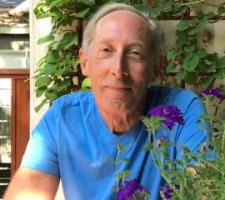Every Atom | No. 143
Introduction to Every Atom by project curator Brian Clements
Swiftly arose and spread around me the peace and joy and knowledge that pass all the art and argument of the earth;
And I know that the hand of God is the elderhand of my own,
And I know that the spirit of God is the eldest brother of my own,
And that all the men ever born are also my brothers . . . . and the women my sisters and lovers,
And that a kelson of the creation is love
The startling imagery that leaps out at the reader in these lines is unabashedly sexual and nakedly intimate. The genderless partner who lays with Whitman on a June morning is passionate and aggressive; the orgasmic aftermath of this experience brings peace, joy and a sense of spiritual awakening or enlightenment to the poet. The lines may be interpreted literally, as the memory of an intense physical encounter, but I have often wondered if Whitman is here revealing a personal transformative experience similar to those described by mystic poets. The mystic experience is one in which the boundaries of self, or ego, are annihilated, resulting in a vast, wordless understanding that all things are one and that “a kelson of the creation is love.” It is an electrifying and life-altering experience, and it is sometimes described by mystic poets in seemingly erotic terms, as an encounter with a divine lover. This “mystical” interpretation in no way negates Whitman’s bold physical presence in “Song of Myself,” or sidesteps his robust sexuality. But it may help to explain, in part, the animating creative force behind this extraordinary work, in which seemingly everything and everyone in mid-19th-century America is seen and described in lovingly equal (democratic) terms. Though Whitman was not a churchgoer as an adult, and was more pantheistic than Christian in his outlook, he was raised within a Quaker community and undoubtedly assimilated Quaker practices and beliefs that may have paved the way for the creative catharsis that led to Leaves of Grass. Among the basic tenets of Quakerism is that God is Love and the light of God (or the Divine) shines in every single person. There is no social or religious hierarchy, no condemnation of the individual. Quakers believe that a person can communicate directly with God without an intermediary, and that spirituality (inspiration) may be cultivated through inward silence or meditation. In my play “Oscar & Walt,” Oscar Wilde asks Whitman if writing Leaves of Grass was “like talking to God.” Whitman replies, “Yes, but God was in myself. I was God, and I was a part of everything. A curtain had opened, you see. A curtain that had obscured my vision. It opened. I saw reality for the first time. Truth without judgment…Everything was alive...”
Recommended
Nor’easter
Post-Op Appointment With My Father
Cedar Valley Youth Poet Laureate | Fall 2024 Workshop







